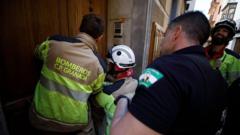In Spain, at least three individuals have tragically lost their lives in connection with a widespread power outage that affected the nation on Monday, according to reports from the Civil Guard. The fatalities occurred in the northwestern town of Taboadela, involving a local family, as stated by several Spanish news outlets.
Law enforcement is examining the possibility that carbon monoxide from a malfunctioning generator may have contributed to the deaths. Details, however, remain scarce, and the exact circumstances surrounding the massive blackout are still under investigation. Authorities reported that the deceased were a married couple and their adult son, discovered by a home care worker on Tuesday morning, as per the Madrid-based newspaper El Pais.
In addition to the family in Taboadela, other fatalities are being scrutinized. A woman in her fifties reportedly perished in a fire in Madrid's Carabanchel district, potentially caused by a candle used during the power outage. This incident occurred during the night of the blackout, and emergency services treated thirteen individuals for smoke inhalation, with five needing hospital care.
Furthermore, in Valencia, a woman in her forties is also said to have succumbed, although there is no clear consensus on the reason for her death. Local authorities suspect her respiratory issues may have been worsened by the loss of power to her medical equipment, whereas other reports indicate she may have succumbed to natural causes.
The power cut wreaked havoc throughout both Spain and Portugal, leading to non-functioning traffic lights, suspended metro services, and businesses unable to process card transactions. This resulted in long queues for cash at working ATMs. Initially, mobile phone networks were also compromised, leaving many residents in search of updates regarding the unfolding crisis.
As the investigation continues, officials are ruling out a cyberattack as the cause of the outage. The situation raises significant concerns about infrastructure resilience and public safety during such outages.
Law enforcement is examining the possibility that carbon monoxide from a malfunctioning generator may have contributed to the deaths. Details, however, remain scarce, and the exact circumstances surrounding the massive blackout are still under investigation. Authorities reported that the deceased were a married couple and their adult son, discovered by a home care worker on Tuesday morning, as per the Madrid-based newspaper El Pais.
In addition to the family in Taboadela, other fatalities are being scrutinized. A woman in her fifties reportedly perished in a fire in Madrid's Carabanchel district, potentially caused by a candle used during the power outage. This incident occurred during the night of the blackout, and emergency services treated thirteen individuals for smoke inhalation, with five needing hospital care.
Furthermore, in Valencia, a woman in her forties is also said to have succumbed, although there is no clear consensus on the reason for her death. Local authorities suspect her respiratory issues may have been worsened by the loss of power to her medical equipment, whereas other reports indicate she may have succumbed to natural causes.
The power cut wreaked havoc throughout both Spain and Portugal, leading to non-functioning traffic lights, suspended metro services, and businesses unable to process card transactions. This resulted in long queues for cash at working ATMs. Initially, mobile phone networks were also compromised, leaving many residents in search of updates regarding the unfolding crisis.
As the investigation continues, officials are ruling out a cyberattack as the cause of the outage. The situation raises significant concerns about infrastructure resilience and public safety during such outages.


















